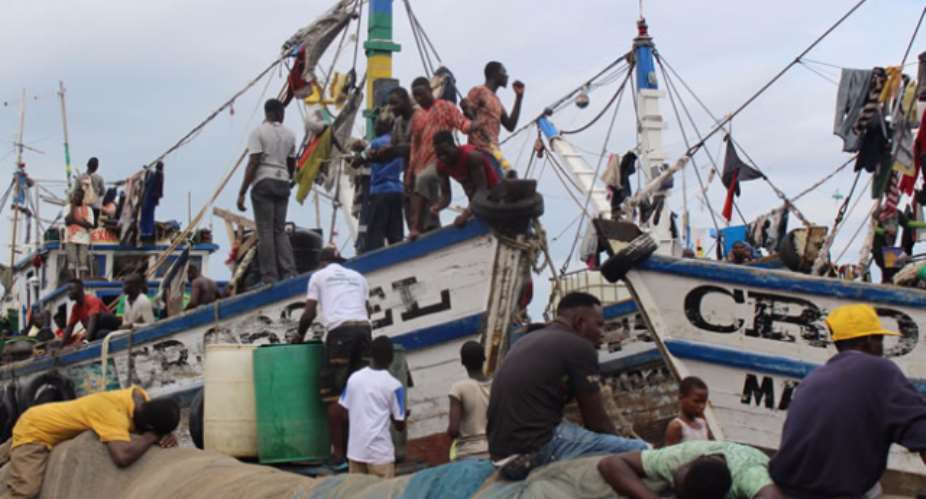A fisheries scientist at the University of Cape Coast (UCC) says it is high time Ghana implemented its fisheries laws to the letter, so the country's fish stocks in the sea could be saved.
Dr Isaac Okyere says there is political interference which has prevented the state from prosecuting law breakers because they know people in high places.
"Once the Fisheries Enforcement Unit do well to prosecute the person breaking the law, then political interferences start with phone calls here and there for the culprit to be considered," the lecturer of the Department of Fisheries and Aquatic Sciences said.
Ghana’s fish production has suffered a deficit of 60 percent as fish stocks in the sea depletes at a fast rate.
The issue of the depletion has engaged the attention of the country for some time now as artisanal fishermen blame each other for the depletion of fish stocks.
The country currently imports over 600,000 metric tonnes of fish and produces less than 400,000 tonnes.
Ghana, which consumes over 950,000 metric tons of fish annually, currently imports over 60 percent of its fish, and in 2016, imported $135 million worth of fish because of the reduction in its fish stock.
According to the Food and Agriculture Organisation (FAO) report, fish provided 6.7 percent of all protein consumed by humans around the world and offers a rich source of long-chain omega-3 fatty acids, vitamins, calcium, zinc and iron.
Joy News’ Richard Kwadwo Nyarko visited Elmina in Cape Coast, one of the vibrant fishing communities along the coast in Ghana and found some of the fishermen did not go to sea.
Kweku Mensah who is an artisanal fisherman at Elmina has over three decades of experience in the fishing industry and he dreads the implications of not having enough catch to enable him to take care of his family.

Fisheries Minister, Elizabethe Afolley Quaye
“Nowadays we don’t get fish when we go to sea, at first it wasn’t like that. The Saeko people [Chinese fishing company] have forced only the small fishes to this place. The Chinese people always get a lot of catch, we don’t. We are suffering,” he said.
According to the 44-year-old man with six children, the work is no longer lucrative and it has been difficult to look after his children in school.
“If they don’t stop the illegal practices, there would not be any fish left for anybody. The Saeko boats sweep all the fish from here to Takoradi, leaving us with no fish to harvest. The government should do something about them, the Saeko people," Mr Mensah lamented.
The artisanal fishermen have resorted to every means possible to get what they want.
They say they do so because the government has allowed what has become known as Saeko business, where large fishing trawlers sweep the entire surface to the bellow of the sea, to thrive.
Research has revealed that due to vast overfishing, nearly 90 percent of global fish stocks are either fully fished or overfished.
A number of worrying factors are threatening the long-term sustainability of the ocean's resources in addition to overfishing.
Dr Okyere and other experts are urging the government to make the laws work without fear or favour so Ghana can get its fish stocks restored.
Story by Ghana| Myjoyonline | Abubakar Ibrahim





 Whoever participated in the plunder of the state must be held accountable – Jane...
Whoever participated in the plunder of the state must be held accountable – Jane...
 A vote for John and Jane is a vote to pull Ghana from the precipice of destructi...
A vote for John and Jane is a vote to pull Ghana from the precipice of destructi...
 I’ll repay your abiding confidence with loyalty, understanding and a devotion to...
I’ll repay your abiding confidence with loyalty, understanding and a devotion to...
 ‘I’ve learnt deeply useful lessons for the future' — Serwaa Amihere breaks silen...
‘I’ve learnt deeply useful lessons for the future' — Serwaa Amihere breaks silen...
 I’m sorry for the embarrassment – Serwaa Amihere apologises for leaked sex video
I’m sorry for the embarrassment – Serwaa Amihere apologises for leaked sex video
 Dumsor: Matthew Opoku Prempeh not in charge of Energy sector – Minority
Dumsor: Matthew Opoku Prempeh not in charge of Energy sector – Minority
 Adu Boahen’s murder: Police arrest house help who was in possession of deceased’...
Adu Boahen’s murder: Police arrest house help who was in possession of deceased’...
 Akufo-Addo nominates Felicia Attipoe as Tema West MCE
Akufo-Addo nominates Felicia Attipoe as Tema West MCE
 Election 2024: I can't have someone I defeated twice as my successor – Akufo-Add...
Election 2024: I can't have someone I defeated twice as my successor – Akufo-Add...
